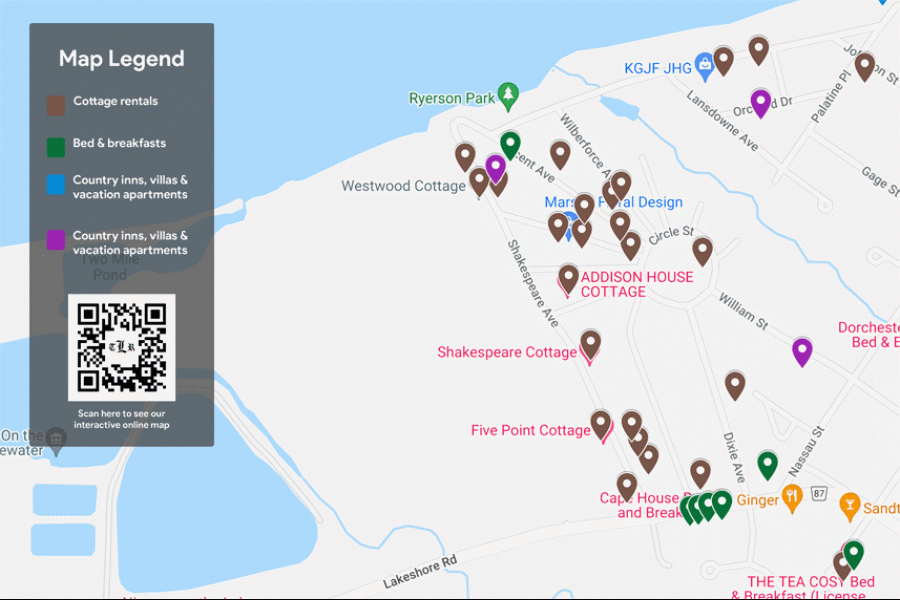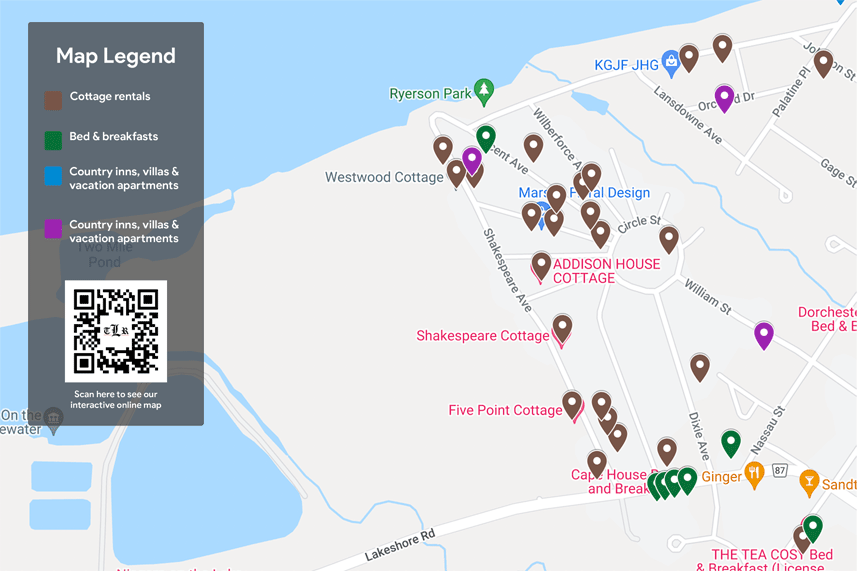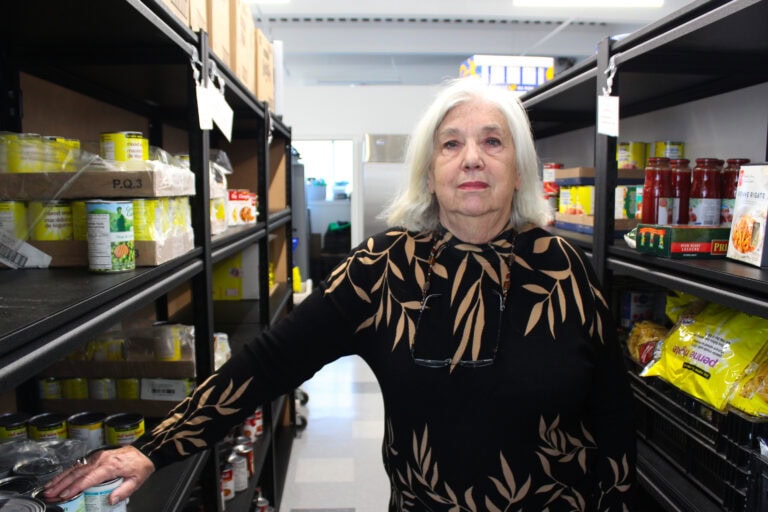In the small neighbourhood of Chautauqua, residents are worried their community is being hollowed out by the growth of short-term rentals, the head of a community association says.
Short-term rentals are “placing in jeopardy the critical balance between residents and visitors that has allowed us to maintain our amazing community while at the same time affording visitors with a great experience,” Brian Crow, president of the Chautauqua Residents Association, told councillors during Monday’s committee of the whole meeting.
The growth of un-hosted short-term rentals has left some Chautauqua homes barren during the off-season and deprives Chautauqua of permanent residents, he said.
According to maps from the Niagara Region, there are about 250 residential homes in Chautauqua. Data compiled by The Lake Report shows roughly 25 short-term rentals in the neighbourhood.
Only one of these rentals is a bed and breakfast, the others are cottage rentals and villas. This means nearly 10 per cent of Chautauqua’s homes are not anyone’s home at all.
“We don’t like driving around seeing empty homes all winter. We like to see kids, we like to see the families coming to the parks,” he said.
“We have a barbecue in September of every summer. We have games for the kids. If we don’t have residents, we don’t have that barbecue. If we don’t have residents, we don’t have a community that looks after each other.”
That sense of community is what makes Chautauqua a special neighbourhood, he said.
“There is no question we are experiencing a hollowing out process due to the number of non-owner-occupied short-term rentals operating in our neighbourhood.”
“Chautauqua is a very unique residential community,” Crow said.
“It is a close and mutually supportive group of people who deeply care about the well-being of their environment, their neighbourhood and each other.”
He listed several examples of Chautauquan’s drive to help each other. He noted the community rallying behind the Tribe and Sherlock family when Shane Sherlock died in February.
He said residents have recently been assisting a neighbour with errands while she is incapacitated and have been shovelling snow for one woman who broke her foot.
“In short, councillors, residents demonstrate that we care every day.”
Crow said he does not consider hosted rentals, conventional bed and breakfasts, within the realm of “short-term rentals” as they provide permanent housing for a resident.
Among Crow’s requests of council was that un-hosted rentals be treated as commercial enterprises and face the same tax regime.
“A short-term rental recently listed for sale stated that the annual short-term rental revenue was $100,000,” Crow said.
“That is clearly a commercial operation.”
Coun. Norm Arsenault pressed Crow as to why a short-term rental should be considered a commercial business but not, for example, a hairdresser who works out of their home.
“Residential realty taxes are for where the house is used as a residence,” Crow replied, noting the residents association was drawing a clear line in the sand between hosted and un-hosted short-term rentals.
A hairdresser operating out of their own home would be akin to a bed and breakfast operator, who lives in the house they also rent.
Crow acknowledged that charging commercial taxes to a residentially zoned property might not be legally feasible and recommended an alternative route for council.
“The town does have the power to license and charge fees. The town could set the annual fee on non-owner-operated short-term rentals at the equivalent between the difference between commercial and residential realty tax,” he said.
Crow asked the town to designate a formula that calculates the maximum number of short-term rentals allowed in a community based on housing density, a recommendation also put forth by the town’s own short-term rental committee last July.
Coun. Gary Burroughs, a member of that committee, noted the town needs to catch up with residents on the short-term rental issue.
“The press are having a full debate about short-term rentals every week now and we haven’t even looked at our report that came from the committee (in July 2021),” he said.
Burroughs said the town should not be waiting so long to deal with an issue at the front of public discourse.
“The residents are not waiting. They’re all making their opinions,” he said. “We need to move on this.”
Chief administrative officer Marnie Cluckie said a report on the short-term rental committee’s recommendations is due to come before council either next week or during April.
Coun. Erwin Wiens said he agreed with Crow in considering un-hosted short-term rentals commercial activities but looked for specific ways to address that concern.
He noted that in order to charge commercial taxes on a residential property, the rental would need to be classified as a corporation, something Crow originally said he was against.
But in conceding that the town may need to get creative in order to deal with the issue, Crow said he would be fine with treating rentals as corporations.
Wiens also drove home a key issue — as NOTL is a tourist town, short-term rentals do provide a place for tourists to stay. In shifting away from short-term rentals, Wiens asked Crow if he was supportive of building more hotels to accommodate tourists.
Crow said he would be open to possible new hotels as part of a comprehensive tourism plan that addresses short-term rentals and transient accommodation.
“If the tourism plan that we have is going to get us more visitors,” Crow said.
He added his concerns are limited to Chautauqua and his desire for more long-term residential homes in the neighbourhood.
“We used to have long-term rentals here. A lot of them have been converted to short-term rentals,” he said.
“We’ve got people complaining that they can’t find a place to live.”
Council unanimously supported sending Crow’s organization’s recommendations to staff for review and inclusion in the forthcoming report on short-term rentals.












